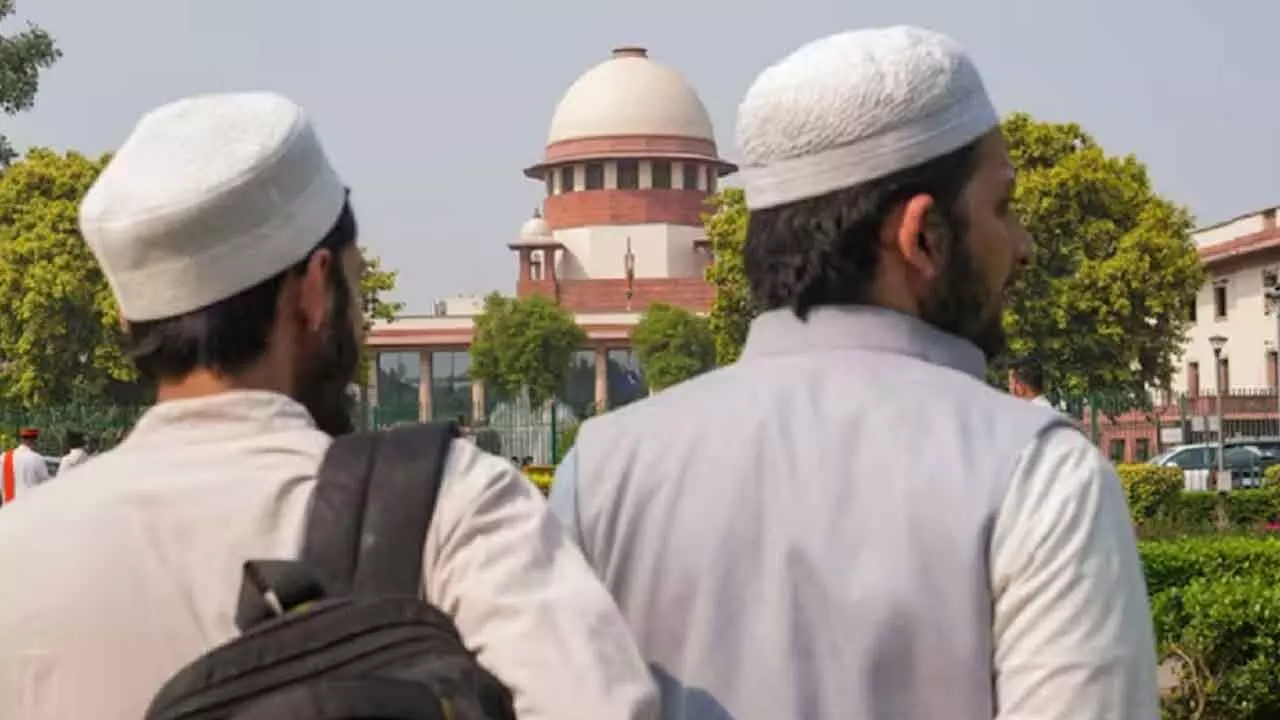Supreme Court’s Intervention Must Shock Modi Government On Waqf Law
On multiple occasions, the court has been found lacking in consistency, issuing rulings that deviate significantly from its earlier remarks
Supreme Court’s Intervention Must Shock Modi Government On Waqf Law

It questioned the inclusion of non-Muslim members on Waqf boards and councils, as well as the authority granted to collectors to alter the status of Waqf land. The Court also signaled its rejection of changes to the status of existing Waqf properties based on the concept of “Waqf by user”
The Supreme Court has compelled the Modi government to pause the immediate implementation of key provisions of the Waqf (Amendment) Act, 2025. However, this instance only highlights the Supreme Court’s reluctance to take a firm stand against the government. Chief Justice Sanjiv Khanna initially displayed some resolve but soon softened the expected rigor. As he is set to retire on May 13, 2025, this was his final opportunity to bolster the credibility of the nation’s highest court, especially given the leniency his predecessors showed in recent years.
Public trust in the Court’s verdicts is waning, particularly when its harsh oral observations during hearings do not translate into consistent judgments. On multiple occasions, the Court has been found lacking in consistency, issuing rulings that deviate significantly from its earlier remarks. How can the public expect anything extraordinary when the Court hesitates to take initiatives to protect the Constitution? Most institutions are in a state of turmoil, and legislative bodies increasingly function as extensions of the executive. Parliamentary proceedings reflect a clear erosion of the moral authority of these offices. Allegations of partiality are so commonplace that they no longer surprise anyone.
Leader of the Opposition Rahul Gandhi has repeatedly complained about being denied the opportunity to speak. Rulings from the chair are frequently challenged by the opposition, yet there has been no substantial effort from the chair to address these grievances. The current regime inherited a robust tradition of legislative conduct but appears unwilling to preserve or enhance it. Opposition members are almost entirely excluded from the law-making process, with the ruling side openly labeling them as enemies.
The context of enacting the Waqf (Amendment) Act hardly inspires confidence. How can Prime Minister Modi claim sincerity regarding the welfare of Muslims? His offensive remarks are well-documented, and he subscribes to the ideology of the RSS, which views Muslims as outsiders who invaded India and destroyed its religious heritage. He has also portrayed Muslims as jewelry snatchers and infiltrators. The public can see how BJP-led state governments have targeted Muslims through various legislative and executive measures. The amendments to anti-conversion laws under the guise of so-called "Love Jihad" are reminiscent of Nazi laws aimed at excluding Jews from public life. How can a modern society justify preventing interfaith marriages? Instances of demolishing houses belonging to minority communities are well-known, with BJP governments openly flouting guidelines. Recently, the Supreme Court criticized the Mumbai High Court for delaying a hearing on a petition against municipal authorities in Nashik regarding the demolition of a Dargah.
The Modi government’s claim that the Waqf (Amendment) Act would benefit the Muslim community, particularly its poorer sections and women, failed to convince the Supreme Court. The Court immediately recognized the law’s disruptive potential. It questioned the inclusion of non-Muslim members on Waqf boards and councils, as well as the authority granted to collectors to alter the status of Waqf land. The Court also signaled its rejection of changes to the status of existing Waqf properties based on the concept of "Waqf by user." These provisions have been put on hold by the government until the next hearing, a direct result of the Supreme Court’s firmness. The government could not justify appointing non-Muslim members to a body tasked with regulating properties created through religious activities. Chief Justice Khanna pointedly asked whether Hindu temple boards could include non-Hindu members, underscoring concerns about violations of Article 26, which guarantees the right to manage religious affairs.
Although the Supreme Court has yet to deliver a final ruling, its indications suggest an intent to curb attempts by the RSS and BJP to legally target Muslim shrines and religious properties. Hindutva forces have claimed several mosques and Dargahs, alleging they were built on the sites of destroyed temples. Of the approximately 8 lakh Waqf properties, at least 4 lakh are classified as "Waqf by user." Many of these date back to the pre-British era, when registration was not required, and some have been in use since the 13th or 14th century. Chief Justice Khanna rightly noted that such properties might lack sale deeds.
However, the Court attempted to balance its stance by acknowledging that the Act contains some positive elements. It also clarified that it would not stay the provision requiring that only a Muslim who has practiced the religion for at least five years can create a Waqf. Despite this conciliatory approach, the Modi regime appears unwilling to engage in dialogue with any institution, including the judiciary. The government seems reluctant to accept the Supreme Court’s role as the custodian of the Constitution. Recent judgments setting timelines for the President to decide on bills and defining the powers of governors regarding state assembly bills have faced criticism from the ruling party. Vice President Jagdeep Dhankhar has gone so far as to question the credibility of judges, referencing an incident involving burnt currency notes at a Delhi High Court judge’s residence and noting the absence of an FIR. He questioned what would have happened if a common person were involved. Dhankhar’s open support for the ruling party raises concerns about the impartiality of a constitutional functionary, which should worry the judiciary.
(The author is a senior journalist. He has experience of working with leading newspapers and electronic media including Deccan Herald, Sunday Guardian, Navbharat Times and Dainik Bhaskar. He writes on politics, society, environment and economy)

